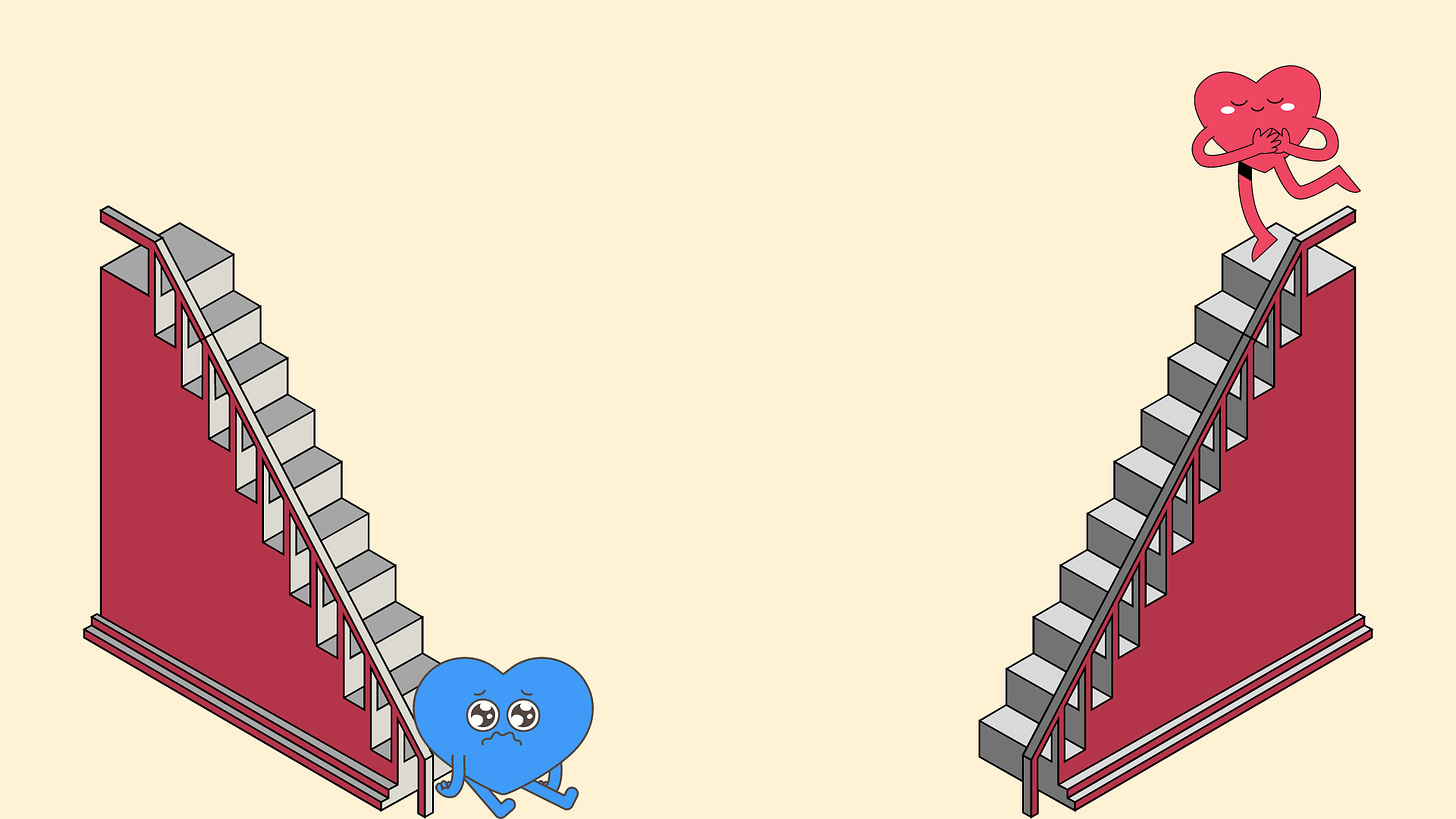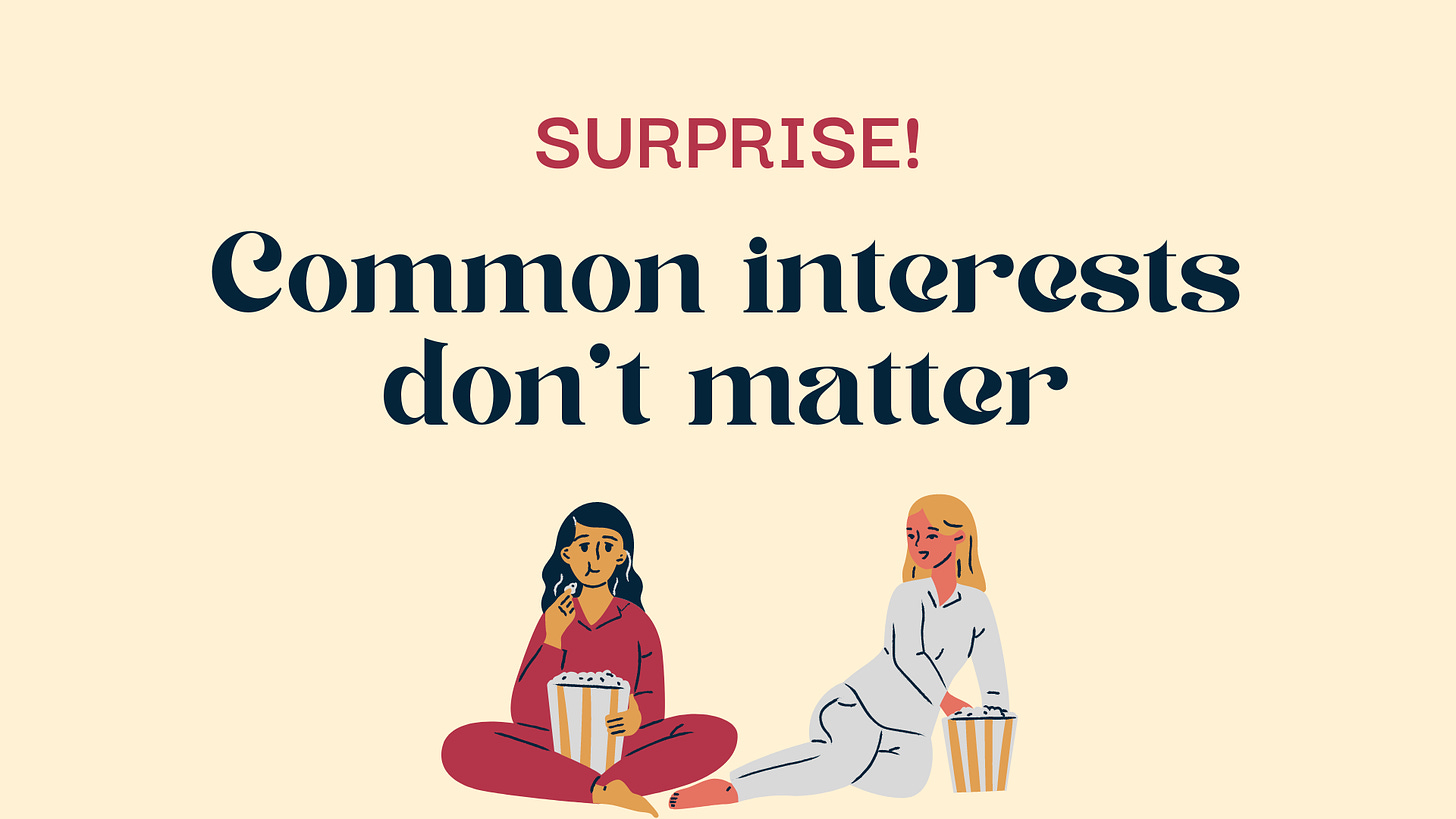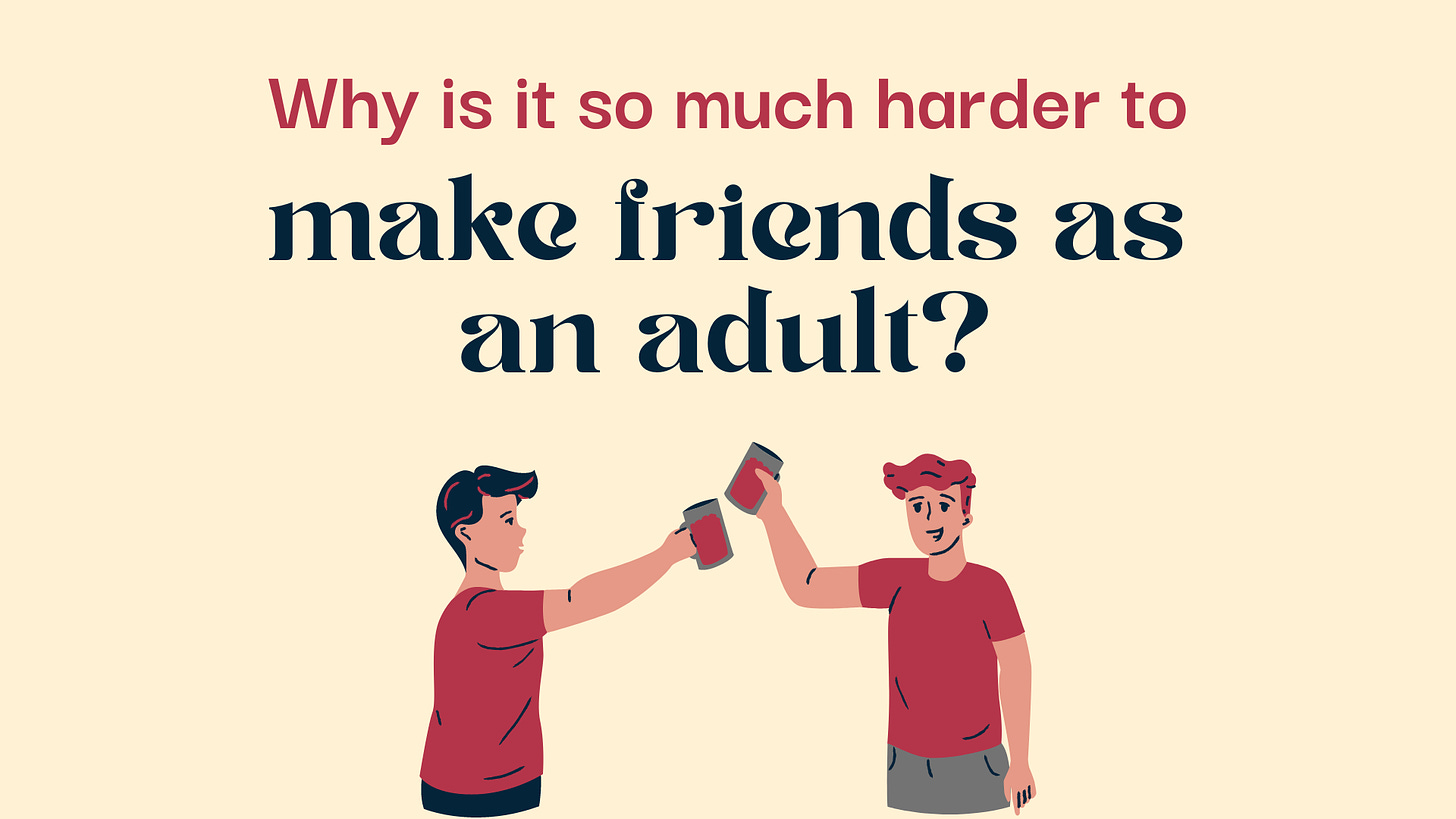How to make friends as an adult
Now that you’re older, wiser, and more emotionally intelligent, it should be easier to connect with people.
But it’s not.
I started digging into research on friendship, platonic love, and building relationships in your 30s. And what I found was startling.
If you want to make more friends, develop deeper relationships, and stop second guessing yourself, keep reading.
Loneliness is deadly
This was the most shocking thing I discovered in all of my research.
Let me tell you the story of two men.
Identical in every way…
except one is going to die much younger than the other.
Their names are Greg and Stephen.
After college, they both move across the country for work. Greg moved to Seattle. Stephen to Atlanta. They have no friends and no connections when they arrive.
✅ Greg is quick to make a new friend group at his local run club.
❌ Stephen is exhausted after work. He stays home playing video games.
✅ Greg gets invited to a friend’s house from run club. There he meets a new group of people, including Rachel. They hit it off, and start dating.
❌ Stephen has casual friendships at work. His colleagues often make plans to hang out after, but something always seems to come up.
✅ Greg has now been dating Rachel for a year and picked up some of her friends along the way. He even started taking yoga at her studio.
❌ Stephen has been dating on Bumble, but nothing has really come of it.
✅ Greg got laid off, and immediately starts asking if anyone he knows is hiring. Within a week, he has 3 interviews, each with a personal recommendation.
❌ Stephen quits his job. He couldn’t really connect with any of his co-workers and he hated his boss. He spends the next 3 months searching for jobs on LinkedIn.
✅ Greg has hopped on a virtuous cycle. Each friendship grows his network, and the possibilities in his life expand.
❌ Stephen has hopped on a vicious cycle. Where isolation, has narrowed his possibilities. He’s become more and more alone.
Although both were in identical physical health, Stephen is smoking 15 cigarettes1 a day.
Well, at least that’s the physical toll that loneliness is taking.
That’s right. Loneliness, is just as deadly as smoking nearly a pack of cigarettes every single day.
The feeling of loneliness sucks but as it turns out, its effects on our health are even worse.
This is why making more friendships as we age is so important.
So I started wondering, how do friendships actually form
It’s always been especially hard for me to make friends with other guys.
Why? Because I don’t like normal guy things.
I don’t play video games.
I never got interested in football.
I’ve been in a relationship for so long, that talking about girls has never been a thing for me.
So for the past 13 years, all of my really good friends have been female.
I was so worried about not being able to connect over “guy things” that I never invested in relationships with other men.
But it turns out, that’s not how we make friends at all.
Since the 1950s sociologists have considered these three things crucial to making close friends:2
Proximity
Repeated, unplanned interactions
A setting that encourages people to let their guard down
Common interests were never something researchers considered to be a prerequisite to friendship. This was a mirage we collectively created.
The thing about interests are, they change.
A decade ago, I hated yoga. Now I love it.
A decade from now, I may love football. Who knows!
Discounting friendships because we don’t have a lot in common actually makes no sense. Instead we need to be focusing on the three very important things mentioned above.
Proximity
Repeated and unplanned interactions
A setting that encourages people to let their guard down
These three are the secret to why some relationships wither, while others blossom.
There’s no way around it, you need to invest time.
If I had to become best friends with someone in 10 days, I know exactly what I would do.
I’d trap them in a room with me.
How to make friends FAST: The Experiment
Researchers studying how friendships form, took two groups of people.
The first group of strangers would stay in a room together. All day for 10 days straight.
The second group of strangers spent only 8 hours a day together. After, they could go home spend time with their friends, family and spouse. They returned to the experiment room the next day.
The results of the experiment were stark.
After spending 200+ hours with each other, the “all day” group described themselves as best friends.
Whereas the 80 hour group—that one that was allowed to have a life outside of the experiment—described their relationships as acquaintances or friendly. But not best friends.
How much time do we need to spend with someone to become best friends?
~200 hours over 6 weeks for best friendships
~ 60 hours over 3 weeks for close friendships
The finding of this experiment was actually not unexpected. This confirmed other research that had been going on for nearly 5 decades.
As is turns out, it’s not simply time spent together, but rather “Time Density”.
This is why it’s possible to be acquaintances with someone for years, but never actually become friends.
You need to spend serious time with people, over a compressed period.
Our 30s are the decade where friendship go to die3
Time
Knowing how crucial time together is for building friendships, you can probably see why children have a much easier time making friends.
We simply don’t have long stretches of time as adults.
The research suggests that—we need to spend 33 hours/week, for 6 weeks straight—to build a strong relationship.
How are you supposed to do that with a 40+ hour a week job?
Context
If time was the whole story, we would be best friends with all of our coworkers.
Up until now, I’ve glossed over the second element of building friendships.
Context.
A turning point in every relationship is the context switch.
If you go to a run club each week—but the only time you see the people there is during your run—you will not become friends.
Until you change the context, the relationship is stuck.
As children, we did this all the time.
We would connect to people through school, but would change the context by:
Hanging out at each other’s houses
Having dinner with their families
Joining sports teams together
Going to the mall, etc.
This leads us to the last reason it’s harder for adults to make friends.
Fear
As a child, asking an acquaintance from school to go to the mall with you was not a big deal.
But somewhere along the line, our adult brains broke and we became fearful and guarded.
So now, we're constantly deciding how much to invest in a relationship based on how likely we think we are to get rejected. Psychologists call this “Risk Regulation Theory”4.
So the 3 reasons it’s so much harder for adults to make friends are:
We don’t have as much free time.
We are keep people within a certain context.
We are more afraid of rejection.
But there’s something we can do about it!
Here are a few things you can put into action now to start making friends as an adult.
By doing so, not only will you live a richer more meaningful life, but you’ll also be avoiding the negative health effects of loneliness.
Unfortunately…
We fall into the adult trap.
We disconnect with how we made friends as a child, and forget:
Time together matters
Everyone is multidimensional
Vulnerability connects people
Friendships aren’t found, they are created
Good news is with a few simple steps, we can start making friends fast, while building rich and thriving social lives.
Here's how, step by step:
Step 1: Join a long term group
Run Club > Networking Event
Book Club > House Party
Church > Bar
Get it?
You’re looking to be a part of something where the same group of people get together frequently. The more frequent, the better.
This helps you easily rack up those crucial hours needed to spark a deep friendship.
Step 2: Assume that they like you
This will unlock your entire social life, if you can manage to do it.
In psychology, there’s something called the “Liking Gap”5 which means that, strangers tend to like us far more than we think.
There’s a certain magic to this.
Why?
Because it takes advantage of a feedback loop called “acceptance prophecy”6. The more we think someone likes us, the warmer and more outgoing we act….and as a result, become more likable.
When making friends—assume everyone already likes you. It sounds naive, but it works.
Step 3: Change the Context
Once you’ve connected with someone, change the setting as fast as possible.
Met at church → Ask to dinner
Met at the gym → Invite to the beach
Met at work → Grab some drinks
By switching the setting, you’re fundamentally switching context in which you view each other. This opens up new topics for discussion and the ability to go deeper than surface-level conversation.
Step 4: Deeper conversation within a month
The final piece to this puzzle, is getting beyond the superficial.
For a friendship to really blossom, both parties must express vulnerablity. Research suggests that this should be done within the first month7.
This doesn’t mean you have to share your darkest traumas, but it should be something you wouldn’t casually tell a stranger.
You’re signaling to the other person, that you trust them, and they’re not just another acquaintance.
Loneliness is on track to be the biggest health crisis of our time, but there are a few things we can do about it.
By continuing to make friendships throughout adulthood, we can lead richer, more abundant, and healthier lives.
Remember
Time together > common interests
200 hours over 6 weeks for best friends
60 hours over 3 weeks for close friends
New people like you more than you think
Meet friends in a context that allows you to let your guard down
Actions
Join a group that meets frequently
Assume that people like you (they do)
Change the context in which you interact
Deep conversation within a month of meeting
—Zac












